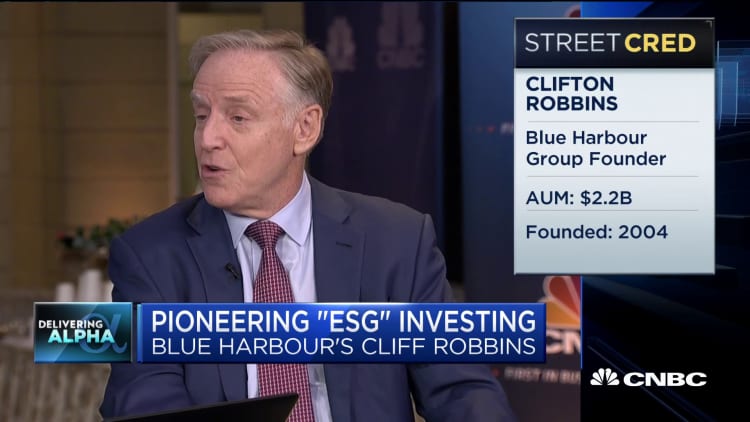
Blue Harbour Group CEO Cliff Robbins said Thursday on CNBC that CEOs will eventually discuss their social impact score alongside other important investment metrics such as analyst ratings and bond ratings.
"I see a situation down the road where CEOs of companies are going to say, 'I've got 5 buy ratings from equity analysts, my Moody's or S&P bond rating is this, and my ESG rating is this," Robbins said at "Delivering Alpha," presented by CNBC and Institutional Investor.
The conference was being held at The Pierre hotel in New York.
"This is how powerful ESG profiles are," Robbins said, using an abbreviation for environmental, social and governance profile, which measures how a company's activities impact those interest areas. He said they will "affect the valuation of companies."
ESG profiles are an increasingly popular topic among investors. McKinsey has called sustainable investing a $30 trillion market. Morgan Stanley recently launched an ESG tool to help advisors and clients evaluate companies.
While some may attribute the ESG trend to socially minded millennial investors, RockCreek CEO Afsaneh Mashayekhi Beschloss told CNBC on Thursday that large institutional players occupy a key role, too.
Robbins said his firm has a set of ESG principles that it began integrating into its investing strategy in 2016. As part of that commitment, he said it began asking a new set of questions to companies it considers taking a stake in.
Those questions, Robbins said, include: What do they think of the gender pay gap? Is the company committed to a more diverse board of directors? Does it have underage people working in overseas factories? Does it have a smoking cessation plan for employees?
"If we're not getting the right answers to those questions, it's making me wonder two things. One, how is this manager evaluating other risks in the business?" Robbins said. "And two, is this someone we really want to put our name and money behind?"
Robbins said applying ESG principles to investment decisions isn't about sacrificing quality; rather, it's the contrary.
"This is not in any way concessionary toward returns," he said. "We actually think it will improve returns."
Robbins said a company's ESG profile isn't the only thing Blue Harbour weighs in its investment decisions. It still considers a company's cash flows and its margin profile, among others.
"It's just another important tool to determining a company's worth," Robbins said.
But if Blue Harbour can identify companies that are inclusive and diverse and supportive of employees, Robbins said, then "that's a good place to invest."






